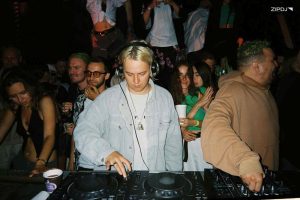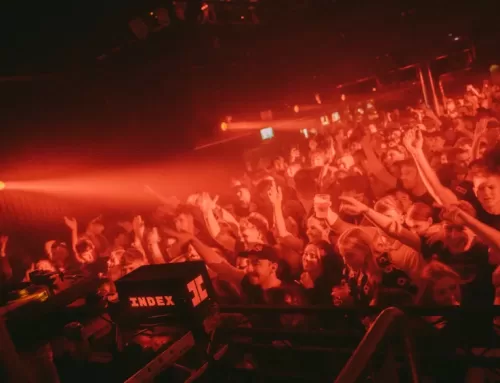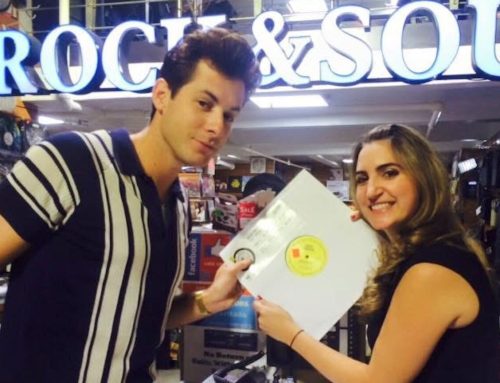
Breaking into the music industry is a challenge, but creating a well-written DJ bio will give you the edge and capture the right people’s attention.
Whether you’re an aspiring hip-hop scratch DJ or committed to the latest house and techno, your DJ biography is essential for developing a career.
In this guide, we’ve outlined everything you need to know to write a well-written bio that you can use in your DJ press kit and other materials to land more DJ gigs.
What Is A DJ Biography?
A DJ bio is a piece of text that outlines your DJing background and niche and explores your DJing style, industry history, and related achievements.
An essential tool for breaking into the DJ industry and developing a career, it’s the first thing that booking agents and venue managers will read when considering your viability.
Outlining your previous DJ gigs and other key selling points, such as unique DJ skills and the production of your own music, can drive attention to a specific target audience.
It can be included in your DJ resume and other content, such as proposal templates, and shared on social media platforms with event organizers.
Ultimately, a DJ bio forms the backbone of a successful promotion campaign, helping you to stand out from the competition and branch out from your local scene.
Why You Should Have A DJ Bio
While a DJ bio can be a valuable tool for reaching out to promoters and organizers and landing a DJ residency, it can also help you build a following of fans.
Many music fans are keen to learn more about their favorite DJs, and by presenting a DJ bio for them to read, they can understand your style and key influences.
A strong DJ biography also works similarly to a business card, delivering a concise life story and understanding of your creative journey.
This is particularly true if it is written with a personal touch that makes the person reading feel they share your passion and appreciate your goals.
As such, it’s an excellent tool for increasing your chances of raising your DJ prices professionally and forging relationships with loyal followers.
How To Write A DJ Bio With Ease: (Step-By-Step)
Now that we’ve covered the main reasons why you should compile a DJ bio, it’s time to break down the process of putting one together that achieves the best results.
While DJ biographies vary depending on the type of DJ and their previous experience, these rules of thumb can be applied across the board.
Step 1: Choose The Correct Format
When you sit down to write a DJ bio, the first thing you need to do is decide on the format you want to use, such as first—or third-person.
While writing in the first person is more intimate, you should aim for a professional tone, so the third-person format is typically preferred.
You can then choose the best fonts for your presentation, changing the font for headers and other key elements, and also using bold text to highlight key points.
Paragraph spacing should be clear, and you should adopt an overall concise and readable style, using tools, if necessary, to correct any poor grammar and spelling.
Step 2: Establish The Tone Of Writing
The next step is establishing the tone of writing you want to use throughout the DJ bio, which should be approached with persuasion methods in mind.
It’s great to showcase some of your individualism and personality in the bio, but if you’re too informal, professional booking agents and promoters are less likely to take you seriously.
This is particularly important if you plan to use your DJ bio for established venues or hope to become a professional corporate event DJ.
Likewise, you should avoid using slang and other colloquial expressions that might be misunderstood or give a negative impression to the reader.
Step 3: Start By Introducing Yourself
Now that you’ve selected your formatting and established the tone of voice, it’s time to start writing the DJ bio, beginning with a simple introduction.
You can keep things fun and creative, using carefully selected words to capture the spirit of your approach to DJing and what motivates you to succeed.
If you’re an experienced DJ, use this information in your introduction so that it is clear from the instant someone reads your bio what to expect.
This can also be used to highlight your enthusiasm for keeping up with the latest music trends before leading into the main bio, which provides more detailed information.
Step 4: Explore Your Musical Background
The next section of an effective DJ bio should dive into your background and what inspired you to hit the decks and pursue a career as a DJ.
This begins with your first experiences with the art of DJing, such as the other DJs who inspired you and the music they performed.
In this section, you can outline your taste in music in detail, including the key moments and pivotal experiences that led you to purchase your first DJ controller.
This could be the first time you DJed a house party or the establishment of a record collection from an early age and how it has informed your style.
You can also share how these experiences influenced your personal ambitions and what you hope to achieve in your career and the music industry.
Step 5: Share Your DJing Skills
With your background covered in detail, the next step when you write a DJ bio is to outline your core DJing skills and the mixing techniques you’ve mastered.
This section can also cover the core equipment you’re familiar with, ranging from the DJ controllers you have experience with to any other relevant DJ accessories.
If you’re adept at mixing and scratching on vinyl or other niche techniques, these should be covered in this section to showcase your unique skills.
Likewise, if you’ve mastered more advanced techniques, such as DJ phrasing and harmonic mixing, cover these skills here as well.
DJs planning to send their DJ bio to promoters at special events often update this section to ensure it covers relevant skills they might be looking for.
Likewise, if you’re using your bio to find work as a mobile or wedding DJ, mention your interpersonal skills and other related skills, such as MCing.
If you’re considering this DJing style, you can also include a concise bullet list of your available equipment, including lights, microphones, and other accessories.
Step 6: Outline Your Previous Gigs
Next in an effective DJ bio is a complete overview of your previous professional experience performing at gigs and events.
This is your chance to stand out from the competition, particularly if you’re a DJ with over a decade of experience and a glowing track record.
If you’ve held a DJ residency in the past or are currently working as a gigging DJ, include information about the venue and your style of music.
DJ bios should also cover notable one-off events, such as annual gigs and festivals, with information about other notable DJs who attended.
If you’ve won any DJ competitions or other related awards, these can also be highlighted in this section to demonstrate your established track record.
Many DJs also produce music and remixes, so if you have experience in this field or any releases on established record labels, cover this here.
Step 7: Avoid Bragging & Name Dropping
When attempting to make money as a DJ, it can be tempting to embellish the truth and make your own bio appear as strong as possible.
While this may succeed in the short run, before long, a promoter or venue booking agent will check up on your claims and realize you’re stretching the truth.
This could result in blacklisting in your local club scene, damaging your reputation and preventing you from pursuing your future plans and landing gigs.
You can easily sidestep this issue, so make sure you avoid lying and exaggerating when writing your DJ biography.
Likewise, name-dropping should also be avoided unless you have directly worked with a big name who can verify your claims.
It might sound impressive to say you’ve partnered with Armin Van Buuren, but if the truth is you stood near him at a music conference, it won’t wash with music industry professionals.
In short, the well-worn expression “honesty is the best policy” should be front and center when you write a DJ bio that reflects your integrity.
Step 8: Include A High-Quality Photograph
Most promoters and event organizers want to put a face to a name, so your DJ biography should also include a high-quality photograph.
Ideally, this photograph will showcase you in action behind the decks, preferably taken at a thriving event and with impressive lighting.
While most smartphones are equipped with a decent camera, if you know someone with a professional mirrorless or DSLR camera, ask them to take the photo for you.
You can then edit the photograph to improve the lighting and other image aspects to deliver a thoroughly professional headshot for your bio.
Software such as Adobe Lightroom and Photoshop will deliver the best results, but there are plenty of subscription-free alternatives you can try instead.
Take the time to get this right, as it can significantly increase your chances of getting the best DJ rates and forging a career as a DJ.
Step 9: Include Your Contact Details
Your contact details should also be included in your DJ bio so promoters and event organizers can easily reach out for more information.
This includes your professional email address and any social media pages you use to share your DJing experiences with friends and followers.
With social media and music becoming increasingly important, you should ensure that your Facebook page and other channels are well-presented and up-to-date.
This can be another tremendous complementary resource for promoters and organizers to check out and a great way to add more value to DJ bios.
Likewise, if you’re focusing on reaching out to local booking agencies, consider including your mobile phone number so they can speak to you directly.
As with the other sections in your DJ biography, check regularly to ensure this contact information is current and not linking to outdated emails.
Step 10: Add Your DJ Bio To Marketing Materials
Once you’ve finalized your DJ bio, the last thing you need to do is add it to all of your related marketing and promotional materials.
Whether you aspire to become a famous DJ or want to land local gigs, your bio needs to be clearly visible on all of your promotional assets.
You can begin by uploading your bio to your personal DJ website, including it in the About page or as a dedicated separate page for visitors.
Next, make sure you link to it in your DJ resume so that each time it is sent to venue agents or promoters, they can quickly access it and read it through.
Other marketing materials that will benefit from including your DJ bio include any DJ proposal templates you’ve drafted to send to venues.
These documents are crucial for landing new gigs and showcasing your skills and experience, and a bio can work as a concise summary in addition to further information.
Summary
Whether you’re applying to perform at special events or looking to land a DJ residency, writing a DJ bio is the first crucial step to succeed.
Following this article’s instructions, you can create a compelling bio that distinguishes you from other DJs and showcases your notable achievements.
As your DJ career evolves, update your DJ bio to include any new gigs and other unique selling points to share with promoters and clients.





Leave A Comment
You must be logged in to post a comment.